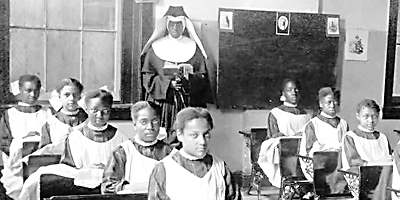
 CHARLESTON—Joi Mayo has a passion for equal education regardless of race or income.
CHARLESTON—Joi Mayo has a passion for equal education regardless of race or income.
So far, she’s turned that passion into a thesis that helped earn her master’s degree from the College of Charleston and a job with Teach for America.
Her thesis was on Immaculate Conception School, which was a predominantly African-American academy operated by the Diocese of Charleston from 1904 to 1973.
The school was initially run by the Sisters of Charity of Our Lady of Mercy and then by the Oblate Sisters of Providence. The Oblates were the first group of African-American nuns.
Mayo’s premise was that parents saw Immaculate Conception as a better way to prepare their children for colleges and careers, and help them move up the social ladder.
Through research and photos, she showed that an intense curriculum and strict teachers, who held their young students to rigorous standards, encouraged success in the black community.
 Mayo gave a presentation to the public recently that was attended by about 90 people, including Immaculate Conception alumni.
Mayo gave a presentation to the public recently that was attended by about 90 people, including Immaculate Conception alumni.
She said this type of school is still needed. Her thesis drew parallels with class struggles today and those of the past, and said parents should learn from previous examples.
By sending their children to Immaculate Conception in the 1930s, Mayo states that African-American parents rejected the attempts of elite whites to create a racially hierarchical education system.
In the economic climate of the times, many African Americans lived in squalor and were relegated to low-paying, strenuous jobs, she wrote.
About 20 percent of homes were without running water and many families squatted in abandoned warehouses.
In an attempt to escape this cycle of poverty, parents sent their children to Immaculate Conception.
Most students — 66 percent — were upper and middle class whose parents were professionals or skilled laborers, she continued.
Other parents did not have the economic means to send their children to a private school, but recognized the advantages offered and scrimped and saved to do so. These men and women held jobs as chauffeurs, janitors, laborers, porters, cooks and domestic servants.
This group of African Americans realized they could rise above their circumstances with hard work.
The motto for the class of 1936 was “we ask not for rest, but strength to labor on.”
Mayo said she is adamant that all youth today should receive the same opportunity for a strong future.
Unfortunately, this isn’t the case in America. It is still a struggle for poor areas of the country, and it is one of the main reasons Mayo joined Teach for America.
The organization states that educational inequity starts early and grows worse over time.
Some of their statistics include:
- By the time they reach fourth grade, children living in low-income communities are already two to three grades behind their higher-income peers.
- Just half of students in low-income communities will graduate high school by age 18. Those who do graduate will perform on average at an eighth-grade level.
- Overall, only 1 in 10 students growing up in poverty will graduate from college.
For Mayo, this is unacceptable.
She left at the end of May to enter what she calls boot camp, where she will receive five weeks of intensive training in the Teach for America program in Mississippi.
That will be followed by classroom training. Then, come the fall, Mayo will receive her first group of students, somewhere in the Appalachian coal-mining area of Kentucky, she said.
She will have a two-year commitment, probably in a subject in which teachers are in demand, such as science, math or foreign language, Mayo said.
